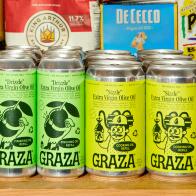How Worried Should You Be About Heavy Metals in Your Drinks?
Two nutritionists offer reassurance about juice, beer and wine.


HRAUN/Getty Images
Until recently, most of us probably hadn’t given a lot of thought to the topic of heavy metals and beverages. But reports about the presence of heavy metals like arsenic, lead and cadmium in fruit juices, which Consumer Reports said its research detected at levels that were “concerning,” and in alcoholic beverages like beer and wine, which an American Chemical Society study found may be a result of the filtration process, may have prompted some of us to wonder how worried we should be.
“Depending on how long children are exposed to these toxins and how much they are exposed to, they may be at risk for lowered IQ, behavioral problems (such as attention deficit hyperactivity disorder), type 2 diabetes, and cancer, among other health issues,” noted the Consumer Reports study, which caused a stir when it was released earlier this year. And while the risk to adults is somewhat lower, long-term exposure to heavy metals may still increase the risk of a host of health issues — from fertility issues and diabetes to cancer, cardiovascular and kidney disease, Consumer Reports observed.
Consumer Reports tested 45 juices (apple, fruit juice blends, grape and pear) and found that 21 of them had what it considered “concerning levels of cadmium, inorganic arsenic, and/or lead.” Thankfully, none of them contained mercury levels deemed by Consumer Reports to be cause for concern. However, “every product had measurable levels of at least one of these heavy metals: cadmium, inorganic arsenic, lead, or mercury,” Consumer Reports found.
That certainly doesn’t sound good. But now that the dust has settled on the report, we asked Toby Amidor, MS, RD, CDN award-winning nutrition expert and Wall Street Journal best-selling cookbook author of The Healthy Meal Prep Cookbook, and Taylor C. Wallace, PhD, CFS, FACN, principal and CEO at the Think Healthy Group and a professor in the department of nutrition and food studies at George Mason University, to weigh in.
Amidor offered reassurance about heavy metals in juice, suggesting that the Consumer Reports report was confusing and unclear and had “unnecessarily alarmed consumers to be afraid of drinking juice, which is safe to drink.”
“While there may be trace or very small levels of some heavy metals in juice, that is true of other plant-based foods that are grown in soil because the soil contains these naturally occurring elements,” she said. “There is no health risk associated with these trace levels.”
Amidor noted that, while both arsenic and lead occur naturally as well as due to human activity in air, soil and water and plant-based foods, the U.S. Food and Drug Administration (FDA) has established limits based on the scientifically assessed public health risks and regularly monitors foods and beverages, including juices, to make sure levels remain below thresholds deemed safe for consumption (10 parts per billion for inorganic arsenic; 50 parts per billion for lead). The FDA publishes the results of its testing as part of its Total Diet Study. Based on the FDA’s findings, Amidor said, there are “no safety concerns” for either inorganic arsenic or lead in juice.
Juice producers generally don’t rely on FDA monitoring alone to ensure safety, Amidor asserted. “Companies conduct their own routine testing and are being innovative in their sourcing and production methods to further reduce levels” of heavy metals in their products, she said.
Wallace sounded similarly sanguine about heavy metals in wine and beer.
“Plants pick up heavy metals from the soil. It's perfectly natural and not a big issue,” he said. “Technology has given us the ability to detect very small quantities.”
As with juice, the FDA monitors alcoholic beverages to make sure the heavy metals contained in them don’t exceed allowable levels.
Although “everything is toxic at some dose,” Wallace said, “low level amounts of metals,” which get into wine and beer from either the grape or the grain, “aren’t an issue in my opinion.”
Still, if you are concerned, Wallace suggested buying your beer from national brands, like Budweiser and Miller, because they test their products for metals in order to display to the FDA that they are in compliance with its standards. But even though small craft breweries may not submit their products to similar testing, Wallace doesn’t consider the amount of heavy metals they may contain to be harmful.
A “bigger issue” with beer and wine, he said, is “getting people to drink in moderation.”
Related Links:

































